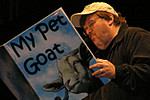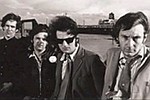 Shadows off the beaten path
Shadows off the beaten pathGAY DAYS | OIL CITY CONFIDENTIAL
< < D O C S > >
last update 25.Feb.10
See also: SHADOWS FILM FESTIVAL
 R E V I E W B Y R I C H C L I N E
R E V I E W B Y R I C H C L I N E
with Daoud Sediqi, Setara Hussainzada, Rafi Naabzada, Lema Sahar, Hameed Sakhizada, Massoud Sanjer, Habib Amiri, Fazl Hadi Shinwari, Tahir Shaqi, Aryn Baker
 release UK 27.Ma.09, US 26.Jun.09
release UK 27.Ma.09, US 26.Jun.0909/UK 1h27
SUNDANCE FILM FEST
 A fascinating glimpse into Afghan culture reveals that young people there are pretty much exactly like everyone else, except for the huge issues they cope with. While exploring pop culture, filmmaker Marking cleverly keeps the big issues churning underneath.
A fascinating glimpse into Afghan culture reveals that young people there are pretty much exactly like everyone else, except for the huge issues they cope with. While exploring pop culture, filmmaker Marking cleverly keeps the big issues churning underneath.
After the Taliban took control in 1979, music was forbidden. So after restrictions were lifted in 2004, Afghans have sought ways to express themselves. Afghan Star is an X Factor-style reality show that gets a huge number of applicants at auditions around the country. Women can participate and winners are selected by a public vote, which for many is their first experience of democracy. Contestants hold political-style campaigns, with posters in the streets and public appearances. It's all very controversial, but programme host Sediqi believes that he was born to rebel against oppression.
The film follows four contestants: The boys Rafi, 19, and Hameed, 20, are great friends despite being portrayed as archrivals by the press. Lema is a happy 25-year-old woman who feels that music should never be hidden. And Setara is a 22-year-old who scandalises the nation by dancing during her performance. Despite a huge public outcry, including death threats, she says, "It's not new to be afraid; it was worse with the Taliban. This is my path and I will continue."
Within this structure, Marking examines Afghanistan's tribal culture, which is bridged by this TV show as people support participants across ancient feuding borders. And as politics threaten to undo the show altogether, the cameras catch some remarkable events that are scary, emotional and extremely hopeful. Most of all is the sense that these young people want their country to move forward without the continued threat of tyranny.
The film also makes a mockery of the West's variations on this show. These people are competing in order to use their musical gifts for the first time, to escape poverty and to stand up for freedom of expression in a still fairly oppressed nation. Marking's approach is witty and engaging, vividly showing off the bright personalities and raw realities as well as the free-spirited atmosphere on the streets. And as things crank up, the film is buzzy and suspenseful. There's a lot more at stake here than a popularity contest.
15.Dec.09
 R E V I E W B Y R I C H C L I N E
R E V I E W B Y R I C H C L I N E
prd Michael Moore, Anne Moore
with Michael Moore, Wallace Shawn, Thora Birch, Marcy Kaptur, Elijah Cummings, Bernie Sanders, William Black, Baron Hill, Steven Moore, Elizabeth Warren, Irma Johnson, Dick Preston
 release US 23.Sep.09,
release US 23.Sep.09, UK 26.Feb.10
09/US Paramount 2h07

 Moore's latest filmed essay is another raucously entertaining trawl through the darker side of America. Of course it's one-sided, as we expect with Moore, but it's also looking at a hugely important subject that naysayers dismiss without even a second thought. So is Moore preaching to the choir?
Moore's latest filmed essay is another raucously entertaining trawl through the darker side of America. Of course it's one-sided, as we expect with Moore, but it's also looking at a hugely important subject that naysayers dismiss without even a second thought. So is Moore preaching to the choir?
His topic this time is pretty clear from the title, and over the course of the film he combines history with current stories. At the core is the theory of capitalism, a system of free enterprise, competition, profit and demand, the ultimate democracy. But the truth is actually the opposite, because democracy is about equality, not a society in which the top 1 per cent has more wealth than the other 99 per cent put together. And the obvious question is why the richest nation on earth doesn't offer health care, higher education, pensions or even enough vacation time to its citizens, while other developed countries have all of these things and more.
To make his point, Moore compares today's society with ancient Rome (facade of wealth obscuring political corruption) and contrasts it with American life in the 50s and 60s (when families could thrive on a single income). After Reagan let Wall Street run wild and free, short-term profits started taking precedence over the wellbeing of employees, which is great for executives but no one else. The central question is why we are so obsessed with getting rich. Less than 100 years ago Jonas Salk gave away the polio vaccine for free so it would reach the most people. Can we imagine any pharmaceutical company doing anything like that today?
In other words, the free market has provided the opposite of the promised human dignity and social justice. And it's even more shocking in the day of bailouts and fear-driven wars. Moore gets a bit bogged down in telling (admittedly compelling) sob stories about heavy-handed home evictions and "dead peasant" insurance claims. And he reserves his strongest criticism for the media's misleading headlines about the dangers of socialism, when it's actually capitalism that leads to greed, exploitation and corporate failure, as current events prove.
Moore assembles this with skill and insight. It may be one-sided, but what's the other side? The fact is that profit-seeking is not good for society. Church leaders are lying when they say Jesus was a capitalist. And America's founding fathers were actually striving for fair socialism, not capitalism, which they spoke out against. But the brainwashed right will ever listen to Michael Moore, so while this film makes liberals happy that these things have finally been said out loud, it won't make any difference.
19.Nov.09
 R E V I E W B Y R I C H C L I N E
R E V I E W B Y R I C H C L I N E
prd Assaf Amir, Maria Feldman
with Eytan Fox, Ellyot, Gal Uchovsky, Adir Steiner, Yossi Even-Kama, Uzi Even, Amit Kama, Rommy Hassman, Michal Eden, Amalia Ziv, Avinoff Frumer, Uri Yanetz, Shimon Shirazi

release Isr 1.Jun.09,
UK Mar.10 llgff
09/Israel 1h12

BERLIN FILM FEST
 This intensely personal documentary chronicles the filmmaker's journey as his nation grapples with the issue of gay rights. It's a fascinating film, but it doesn't always cross over to a wider relevance.
This intensely personal documentary chronicles the filmmaker's journey as his nation grapples with the issue of gay rights. It's a fascinating film, but it doesn't always cross over to a wider relevance.
In 1978 Israel, homosexuals were being thrown out of their homes, hunted by police and harassed by the general public. As a young man, filmmaker Qedar realised this had to change: "We have to make ourselves visible, because we have no choice." And through this film he revisits friends from the 80s and 90s, remembering life in the few gay clubs and cruising grounds. And they also talk about momentous shifts in the media, culture and politics that culminated in the summer of 1998 with Tel Aviv's first Pride event.
The film has a relaxed and intimate feel as Qedar and his articulate interviewees remember the days when everyone was married and only secretly gay, the arrival of Aids with its accompanying fear and panic, and the small steps the community made along the way. The film's primary focus is on politics, which is rather Israel-centric in the way the events pitted religious leaders against a growing secular society with activism, debate and even riots.
Qedar uses a rich mix of photos, newsreel footage, home movies and clips from media milestones on film, television and stage. It's a fast-paced doc, cracking through the history with energy and emotion, as these events clearly linger in the memory of everyone involved. And even though the film gets bogged down in its Tel Aviv perspective, it touches on wider issues such as the Israeli-Arab rift and Israel's place in Europe, as seen through the victory of Dana International at Eurovision 1998.
In the end, Qedar and friends make the important point that there's much more to homosexuals than sex; why should someone be stripped of their rights as a citizen simply because of whom they chose to live with? And the personal stories, such as the orphaned Even-Kama's adoption by a high-profile gay couple, are extremely involving. But it's the film's quiet commentary on how selfish and insular the gay community is now that's perhaps it's most important point.
21.Feb.10 llgff
 R E V I E W B Y R I C H C L I N E
R E V I E W B Y R I C H C L I N E
prd Stephen Malit
with Lee Brilleaux, Wilko Johnson, John Martin, John Sparkes, Chris Fenwick, Alison Moyet, Joe Strummer, Clem Burke, Suggs, Jools Holland, Andy Gill, Richard Hell, Glen Matlock
 release UK 2.Feb.10
release UK 2.Feb.1009/UK 1h44

 This third part in Temple's trilogy about British music in the 1970s (after THE FILTH & THE FURY and THE FUTURE IS UNWRITTEN) inventively documents both a town and a group of musicians. And like the other docs, this one is mainly for fans.
This third part in Temple's trilogy about British music in the 1970s (after THE FILTH & THE FURY and THE FUTURE IS UNWRITTEN) inventively documents both a town and a group of musicians. And like the other docs, this one is mainly for fans.
Canvey Island in the Thames estuary is known as Oil City for the refinery that dominates the horizon. It's also a scruffy beach community and home to the members of Dr Feelgood. Lee, Wilko, Figure (Martin) and Sparko (Sparkes) started playing music out of camaraderie and boredom, then realised it might be a way off the island when their distinctive style caught on in 1973. Without trying to build a slick image as a band, they made it onto the cover of NME before they even had a recording contract.
The film pieces together this story through first-hand memories recalled on camera and illustrated by old footage, stills, recordings and hilarious cutaways to archive movies. It charts their rise to global fame and then the issues that pulled them apart; the main problem is a clash between Wilko and Lee, fuelled by rampant egos, plus of course drugs and alcohol. Temple captures all of this with a wonderful sense of the time and place, focussing on the personalities of these guys and the society they lived in.
He also places them carefully within music history, as their style of R&B sounds intriguingly like punk before there was such a thing. And Temple shows us their influences, from the blues masters to the Shadows and the Stones. This is a lively, engaging account told mainly through personal reminiscences, which gives it all a much more intimate tone, drawing out both the wit and warmth of these extremely creative men.
We are also acutely aware of how young they were when they faced their imminent fame, completely intoxicated with the life they were entering after such a dull childhood in a forgotten corner of Britain. For a change, it's also nice to see a film that takes a realistic approach to drug use (it wasn't all bad: shock!) and also puts issues of mortality in context without getting maudlin. Dr Feelgood fans will love this.
12.Jan.10


See also: SHADOWS FILM FESTIVAL
© 2010 by Rich Cline, Shadows
on the Wall